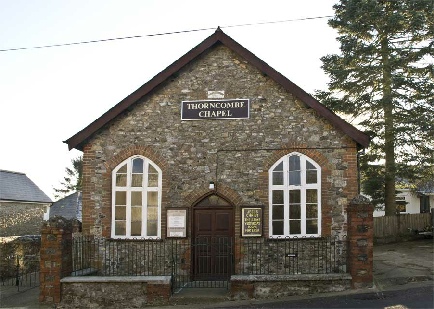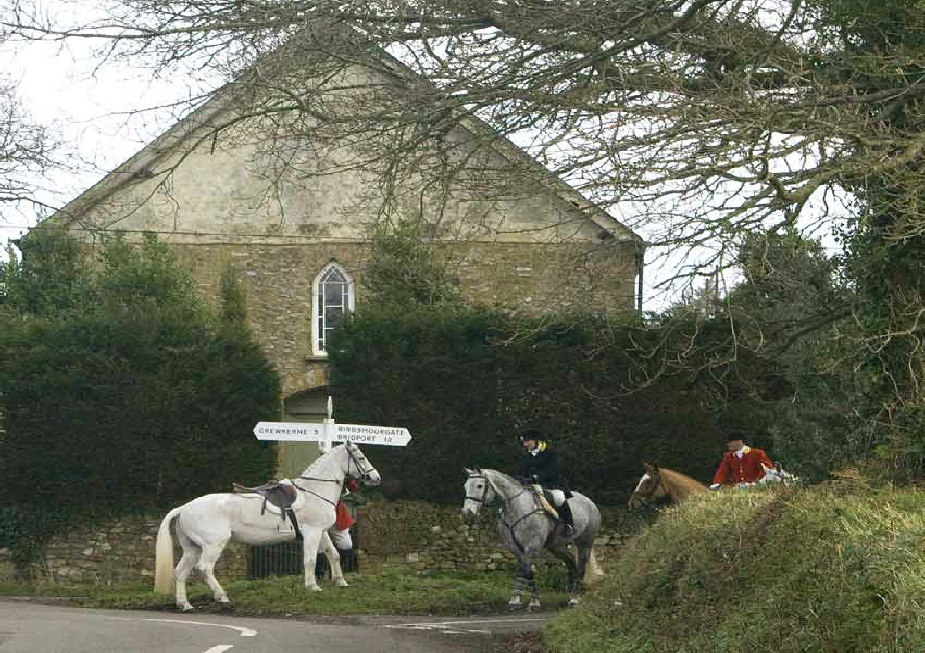THORNCOMBE’S CHAPELS
Thorncombe’s long non-conformist tradition dates back to the late 17th century with
the establishment of a Quaker meeting in the parish. That independence of spirit
among local people still extends to their worship. There is a small Gospel Hall in
the centre of the village, and a United Reform Church just over the parish boundary
at Venn which gazes serenely over the hills towards Thorncombe. Venn Congregational
Church became part of the United Reform Church in 1972. Although the congregation
has now dwindled to a comparative handful, monthly services are still held in the
chapel with visiting ministers coming from Bridport, Crewkerne and surrounds, as
they have done for over 100 years. [The Chapel has since closed and is now a private
resid ence EH]
ence EH]
Gospel Hall
Until the late 19th century, people from Thorncombe attended services at Winsham
Chapel when land became available in their home parish to build their own Gospel
Hall. The site of a bakery destroyed by fire, was purchased and building began in
1878. It was built up to eaves level when the money ran out. For a time the walls
were covered with reed until more funds became available two years later. The building
was completed in 1881 by Mr Harris of Chard, Builder. The sounds of singing from
the two services held in the chapel each Sunday are loud and joyful and there is
often a mid week service which is also well attended. This has been the pattern since
the completion of the building, together with the afternoon Sunday schools. The 1981
centenary celebration packed the chapel with people from a wide area. In 1980 further
buildings were added including a schoolroom, kitchen and toilet.
Venn & Ebenezer Chapels
Built in 1816 on ground given by George Trenchard of Chaffey, during a time when
the cloth industry was in full swing, Venn Chapel’s records testify to a cheerful
congregation, determined to own a place wherein to joyfully worship God in their
own way. Working class wives and children gathered flints from the fields free of
expense from the farmers. The whole chapel was built using voluntary labour. For
a time Anglicans and Nonconformists occupied the chapel together, alternating services
between their two preferences, but eventually the Anglican congregation became dissatisfied
and left the chapel, moving to Blackdown church.
After Hugh Trenchard inherited Chaffey he allowed a group of Baptists to use the
chapel in the evenings when the Congregatonalists did not want its use. But this
arrangement proved unsatisfactory so the Baptists moved their services to the Ebenezer
Chapel at Stony Knapps, now fallen into sad ruin. Eventually the Congregationalists
sought to obtain legal to Venn Chapel from Hugh Trenchard. An agreement was reached
and the life of Venn Chapel proceeded over the years with members keeping it in repair
by dint of hard work and fundraising.
Chapel records speak of meetings and anniversaries celebrated with great enthusiasm.
There were Sunday school treats and outings, with the venue for many of their teas
being Chaffey Farm, under the benign eye of the Trenchards. An entry in 1896 tells
how rainy weather threatened to spoil an outing. So local farmers used their wagons
to take children, teachers and friends to West Bay. ‘A most enjoyable day was spent,
and strange to say, several parents, though living so near had never seen the sea
before’. This gives us some idea how closely tied to their village people were in
those days. The first marriage at Venn Chapel took place in 1906 . It was between
Mr J Stuckey of Thorncombe and Alice Bishop of Broadwindsor. In 1929 our own W.I.
member Mrs Foxwell was married here, leaving after a reception for her new home at
Sadborow Mill.
JUNE EDE
Taken from the late June Ede’s unpublished manuscript, ‘Thorncombe, A Village History’.
June lived in Thorncombe village from 1968 until shortly before her death in 2009.
Written in 1982 in response to a national Women’s Institute initiative, it was donated
by Mrs Ede, to the TVT history box in 2008. Reproduced here by kind permission of
June’s daughter, Penny Kennedy.
It is understood that the Ebenezer Chapel at Stony Knapps, in the parish of Winsham,
was built 1861 as a Baptist chapel and fell into disuse in the twentieth century
and was briefly used as a youth centre before being converted into a family home
in 1987. (EH September 2016)





 ence EH]
ence EH]